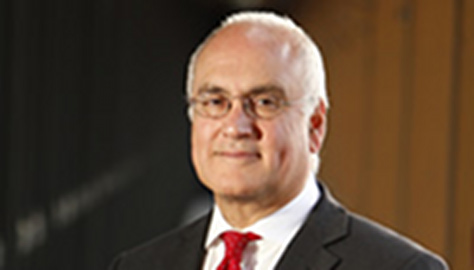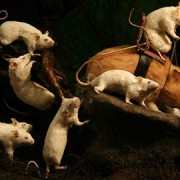Sir Michael Wilshaw was appointed last week as the new chief inspector of school and dhildren’s services, replacing Christine Gilbert, who stepped down in June after four years in the post.
Wilshaw, head teacher of Mossbourne academy in Hackney, was hailed as a ‘miracle worker’ after achieving outstanding exam results.
He has been picked out by Education Minister Michael Gove, for his robust approach to discipline, teaching and learning at the inner city comprehensive.
Mossbourne was widely recognized as Britain’s strictest school because of its traditional uniform policy, regulation haircuts and Saturday morning detentions.
Pupils are banned from visiting nearby fast-food shops (even on the way home), hair must be neither too short nor too long, ties must be straight and there’s even a Mossbourne Academy woolly hat for cold weather.
Wilshaw was brought up as a Catholic and faith is still very important to him. “I have an evangelical zeal to do Christ’s work on earth. I want to do the sorts of things Christ asked us to do: doing your best for children, particularly those from disadvantaged backgrounds.”
Remarkably enough, pupils are required to recite a mantra before every lesson: “I aspire to maintain an inquiring mind, a calm disposition and an attentive ear so that in this class and all my classes I can fulfil my true potential.”
Mossbourne also won plaudits as ‘The school that beat the riots’ after none of its pupils was involved in the recent disorder that erupted in the Hackney area.”
The 64-year-old, who was knighted in 2000 for services to education, was courted for the role by Michael Gove, the education secretary, calling Wilshaw ‘my hero.’
Mossbourne was not his first success. Between 1985 and 2003 he was headteacher in another deprived area of east London turning St Bonaventure’s Catholic School for Boys in Forest Gate, into one of the most improved schools in the country. In addition, he was seconded to ‘turn around’ another failing school in Canning Town in 1998.
Other than Mossbourne, the emerging troubleshooting superhead has an astonishing variety of other jobs: education director of the charity Ark which is a sponsor of eight academies; executive principal of the Globe academy in Southwark, south London; and executive head of Haggerston, another Hackney school.
But his regime is not to everyone’s taste. Sir Michael’s style has been controversial at times and his methods hit the headlines in 2007 when he banned pupils from hugging each other.
Vehement opponents of academies object both to the style and ethos of such schools. They ask: Why is tennis better than basketball? Why not study media when we all agree information technologies are changing the world? Why study Latin and not Chinese?
The competition for entry – there are now 1,500 applicants for 180 places and when the school first opened for business, police had to be called to appease parental clamour at the gates – suggests views expressed by dissidents are those of a small minority.
Even his critics, agree that Wilshaw’s achievement at Mossbourne is impressive. This summer, after its first A-level results, seven of Mossbourne’s pupils got places at Cambridge, one went to the Royal College of Music and 65% went to Russell Group institutions – the 20 most prestigious universities in the UK.
Some 82% of pupils achieve at least five good GCSEs including English and maths – far above the national average of 53%. Under his leadership, the academy received an “outstanding” rating from Ofsted in two consecutive inspections.
Though his emphasis on behaviour gains support from some parents and teachers, his commitment to competition goes against the beliefs of many supporters of comprehensive state education: that schools must work together to improve standards, that the rivalry between schools is divisive, that a market-based system producers losers as well as winners.
Wilshaw told the Guardian, “It’s up to every school to fight for its corner, and that’s what’s happened in Hackney,” he says. “Hackney was the most improved borough last year in terms of GCSE results. Competition does that.” He is ambivalent about profits for school providers, recently ruled out by Gove under pressure from the Lib Dems – “I’m not philosophically against that, and I think it might come in at some stage.”
Wilshaw will be taking on the challenge at a time when the country’s education landscape is changing. At present, one in three pupils attends academies and a new wave of free schools is expected to be announced shortly. Ofsted’s brief is slimmer than it was for Wilshaw’s forerunner.
“We’re at a really interesting stage in our country’s history. Our empire is gone, we’re in Europe but we’re not part of the euro, we’ve got the recession, what’s going to happen? We’ve got turmoil on our streets, and large swaths of our country disassociated from social norms. I think policy-makers have got to come together to forge a way forward. It could get worse or it could get better, and schools are part of that,” he told the Guardian.
Sir Michael subscribes to the view that schooling standards are slipping and calls for an overhaul of the English education system. From January, under his leadership, it will concentrate more on pupils’ behaviour, teacher quality and children’s reading. It also intends to make it harder to give schools a rating of “outstanding.”
He also wants to challenge schools to do better because, he feels, the UK is falling behind comparable nations in international league tables.
“Have we gone for the soft option too often? Yes, we have. At 15, we’re two years behind China in maths. We as a nation should be alarmed,” says Wilshaw.
Part of Ofsted’s remit is to bring in a a new inspection framework, focusing on four key areas: pupil behaviour, achievement, teaching standards, and school leadership. This also includes inspecting children’s homes and children’s services.
He is said to have already drawn up plans for the first 12 no-notice school visits this autumn.
Currently, Ofsted normally gives schools two days notice – already severely reduced from the six weeks once allowed.
Gove told the Guardian he could not think of a better person to lead Ofsted. “He is one of the best educators of his generation… He has transformed the fortunes of thousands of children during his time as a headteacher.”
“He truly understands what success looks like and knows how to achieve it – even in the most challenging circumstances. This role will allow more heads, teachers and other professionals to be influenced by this talented and inspirational leader.”
“I have every confidence that his appointment will help to raise standards in education and children’s services in England.”
Shadow education secretary Stephen Twigg said he was delighted with the appointment.
“Sir Michael’s record and the achievements of Mossbourne Academy show what can be done, not just with the right structures, but also with a focus on rigorous standards, quality teaching and discipline,” says Twigg.
Wilshaw states that the true test of his achievement at Mossbourne lies in ‘sustainability.’ It is impossible to deny the fact that Wilshaw – whether due to his traditionalist approach or the academies model – has produced an excellent school. Only time will tell if he can repeat the trick nationwide.





